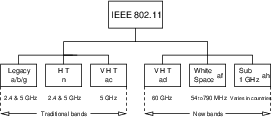- The paper presents a comprehensive survey of MU-MIMO MAC protocols, categorizing them into coordinated, un-coordinated, and integrated up/downlink schemes.
- It discusses key design factors including de/pre-coding techniques, CSI acquisition, and scheduling algorithms to mitigate interference and boost performance.
- The survey underscores emerging trends such as full-duplex, massive MIMO, and cross-layer design as future directions for WLAN advancements.
Survey of MU-MIMO MAC Protocols for Wireless Local Area Networks
Introduction
The paper "MU-MIMO MAC Protocols for Wireless Local Area Networks: A Survey" provides a comprehensive survey of Medium Access Control (MAC) protocols for Multi-user Multiple-Input and Multiple-Output (MU-MIMO) systems, which are a significant advancement within the IEEE 802.11 standard frameworks for WLANs. MU-MIMO improves network efficiency by allowing simultaneous data transmission to or from multiple users, significantly increasing throughput and spatial diversity compared to Single-user MIMO (SU-MIMO).
Overview of IEEE 802.11 Standards and MU-MIMO
The IEEE 802.11 standards encompass various amendments aimed at enhancing PHY and MAC capabilities. Key among these is the inclusion of MU-MIMO, which was introduced in IEEE 802.11ac and further extended in subsequent standards. MU-MIMO allows multiple spatially-separated stations (STAs) to communicate with an access point (AP) simultaneously, leveraging increased antenna capabilities to boost network performance.

Figure 1: IEEE 802.11 frequency bands.
MAC Protocol Categories
MU-MIMO MAC protocols are classified based on the coordination level required in their operation:
- Un-coordinated Access: These protocols rely on distributed mechanisms where STAs independently access the channel. Commonly utilized mechanisms include synchronous and asynchronous data transmissions.
- Coordinated Access: These protocols involve explicit coordination by the AP, which schedules transmissions among STAs to optimize the use of spatial resources.
- Integrated Up/Down-Link Protocols: These protocols address both uplink and downlink MU-MIMO scenarios, aiming to streamline overall network efficiency and resource utilization.
Design Considerations for MU-MIMO MAC Protocols
Implementation of MU-MIMO requires careful consideration of various factors:
- De/Pre-coding Techniques: Efficient separation of signals (MUD) and minimization of interference (MUIC) are vital. Techniques such as Zero Forcing (ZF), Minimum Mean Square Error (MMSE), and Dirty Paper Coding (DPC) are frequently employed.
- Channel State Information (CSI) Acquisition: Accurate CSI is crucial for effective MU-MIMO operations. Feedback schemes play a key role in ensuring up-to-date channel information is available for precoding decisions.
- Scheduling Algorithms: Effective STA scheduling, particularly in high-density environments, is necessary to ensure fair access and optimal network utilization.

Figure 2: MUIC schemes.
Future Directions
Emerging trends and future directions in MU-MIMO MAC protocol development include:
- Full-Duplex and Massive MIMO: These technologies promise further efficiency gains but introduce new challenges related to interference management and hardware complexity.
- Cross-Layer Design: Integrating MU-MIMO at both MAC and PHY layers can help realize substantial gains in throughput and efficiency, especially in dense networks.
- Dynamic CSI Feedback: Developing adaptive feedback mechanisms that adjust the frequency and scope of CSI reports based on network conditions is critical for maintaining performance without incurring excessive overhead.
Conclusion
MU-MIMO represents a pivotal evolution in WLAN technology, driven by the demand for higher throughput and reliable performance in dense environments. While substantial progress has been made, ongoing research is necessary to address challenges related to CSI acquisition, efficient STA scheduling, and integration with emerging technologies like full-duplex systems. Further work on harmonizing these approaches with future IEEE amendments will be crucial in the continual evolution of WLANs.



